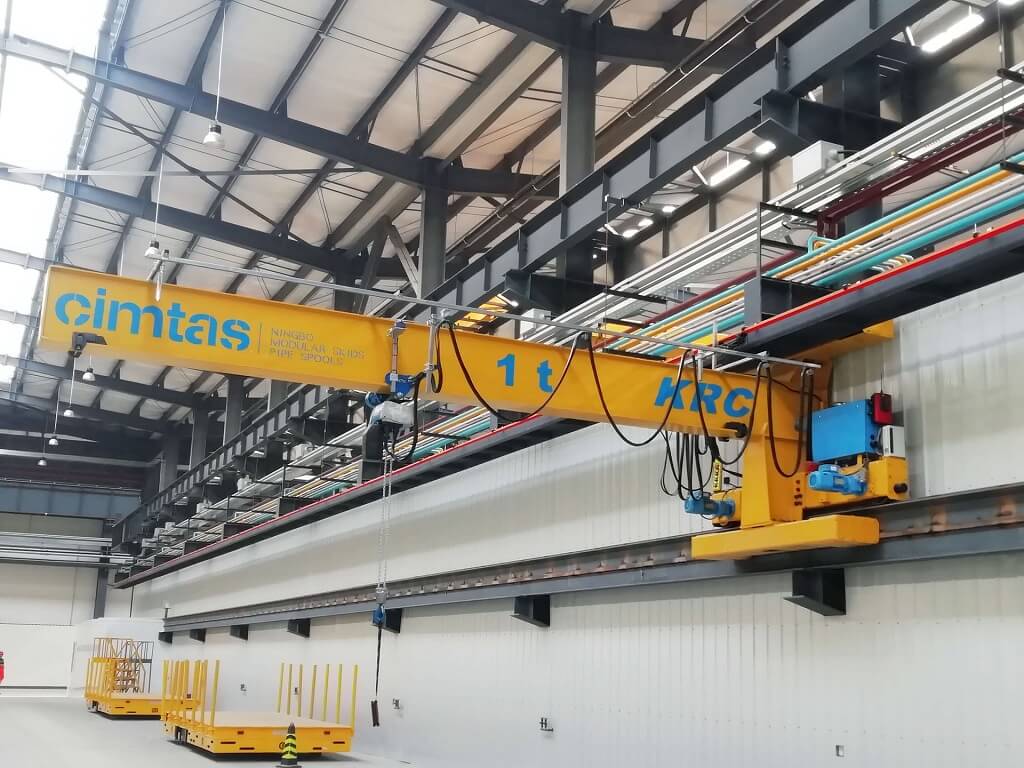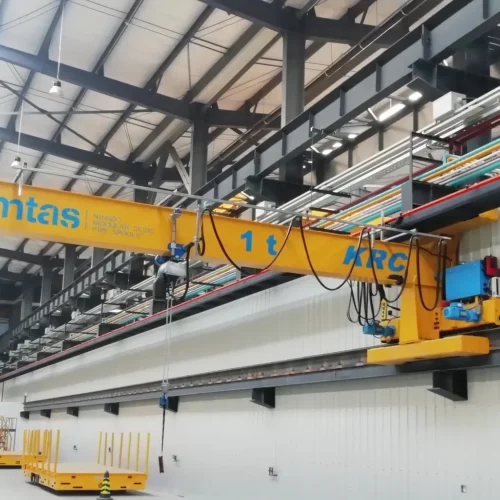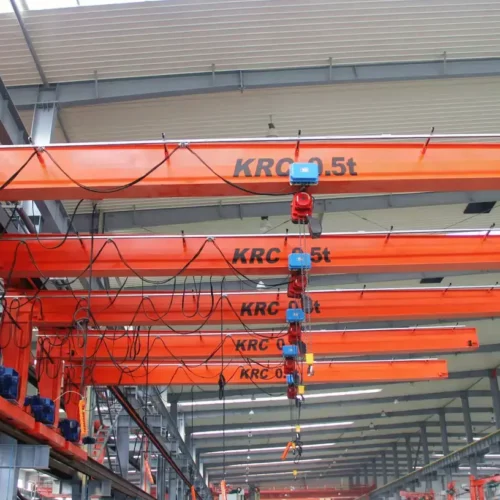1 ton jib crane for sale Safety Certifications
When purchasing a 1-ton jib crane, ensuring it meets stringent safety certifications is crucial for safe and efficient operation. Here are some key safety certifications to look for:
1. OSHA Compliance: The Occupational Safety and Health Administration (OSHA) sets standards for workplace safety and health. Ensure the crane complies with OSHA regulations, specifically 29 CFR 1910.179 and 29 CFR 1926.550.
2. ASME B30.11: This standard by the American Society of Mechanical Engineers outlines safety requirements for jib cranes. Compliance indicates the crane meets essential design, construction, installation, and operation standards.
3. FEM Standards: The European Materials Handling Federation (FEM) provides guidelines for the design and usage of lifting equipment. Adherence to FEM 1.001 indicates the crane’s reliability and safety in various operating conditions.
4. CE Marking: For cranes intended for the European market, the CE marking indicates conformity with European safety, health, and environmental protection standards.
5. ANSI Compliance: The American National Standards Institute (ANSI) provides additional safety and performance standards. ANSI/ASME BTH-1 (Below-The-Hook Lifting Devices) is relevant here.
6. ISO Certification: The International Organization for Standardization (ISO) offers standards such as ISO 9001 for quality management and ISO 14001 for environmental management, ensuring the manufacturer maintains high-quality processes.
7. UL Listing: Underwriters Laboratories (UL) certification ensures electrical components of the crane meet safety standards.
When purchasing, request documentation of these certifications from the manufacturer or dealer. Also, consider warranties, after-sales support, and whether the crane has undergone rigorous testing. These certifications are vital not only for legal compliance but also to safeguard operators and optimize operational efficiency.
List Reference Technical Parameters of “1 ton jib crane for sale”
When evaluating a 1-ton jib crane for sale, several key technical parameters must be considered to ensure compatibility with your operational needs. Here are the primary specifications to review:
1. Load Capacity: Ensure the crane can lift up to 1 ton (approximately 2,000 lbs).
2. Boom Length: This is the horizontal reach from the central support to the end of the boom. Common lengths range from 10 to 20 feet, but ensure it meets your space and reach requirements.
3. Height Under Boom: This is the vertical distance from the floor to the underside of the boom, typically between 8 to 20 feet, depending on ceiling height and working clearance.
4. Rotation: Jib cranes can offer 180, 270, or 360-degrees rotation. The degree of rotation needed depends on the working environment and how far around you need to lift.
5. Mounting Options: Jib cranes can be either floor-mounted (free-standing), wall-mounted, or column-mounted. Each mounting option should be compatible with your facility layout and structural integrity.
6. Boom Rotation Limits: Some cranes feature mechanical stops to limit rotation, which can be critical in confined spaces or specific working areas.
7. Power Supply: Electric-powered models will require specification of voltage and phase (e.g., 220V, 3-phase). Manual models don’t need a power supply, making them suitable where electrical connections are limited.
8. Hoist Type: Check whether the jib crane includes an electric hoist, manual chain hoist, or if a hoist must be purchased separately. Ensure compatibility with the hoist system.
9. Materials and Construction: High-grade steel used in the construction ensures durability and the crane’s ability to handle the specified load.
10. Safety Features: Look for integrated safety features such as overload protection, emergency stop mechanisms, and compliance with relevant standards (e.g., OSHA, ANSI).
11. Installation Requirements: Assess the installation complexity, which may involve concrete foundations and structural engineering for free-standing models.
12. Environmental Adaptation: Consider any environmental considerations like outdoor use, which would require weatherproofing, or usage in high-temperature areas, necessitating heat-resistant components.
Reviewing these parameters helps ensure that the 1-ton jib crane you choose fits your specific lifting tasks and operational environment.
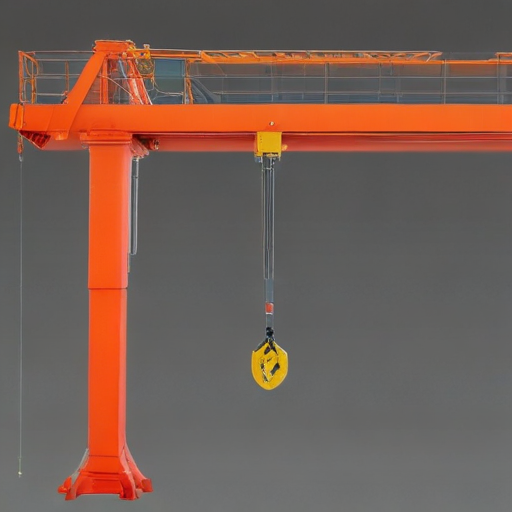
List Product features of “1 ton jib crane for sale”
A 1-ton jib crane is a versatile and efficient lifting solution commonly used in workshops, manufacturing plants, and warehouses. Here are the key features of a 1-ton jib crane for sale:
1. Load Capacity:
– Capable of lifting loads up to 1 ton (2,000 pounds), making it suitable for a wide range of materials and equipment.
2. Design:
– Available in various configurations, including wall-mounted, floor-mounted, and portable designs to suit different spatial requirements.
3. Boom Length:
– Comes with adjustable boom lengths ranging from 8 to 20 feet, allowing flexibility in reach and coverage.
4. Rotation:
– Offers rotation capabilities up to 360 degrees for floor-mounted models and 180 degrees for wall-mounted models, enabling extensive maneuverability.
5. Construction Material:
– Constructed from high-strength welded steel, ensuring durability and long-lasting performance.
6. Ease of Installation:
– Designed for straightforward installation with minimal downtime and can be easily integrated into existing facilities.
7. Electric or Manual Operation:
– Available with electric or manual hoists, catering to different operational preferences and budgets.
8. Safety Features:
– Includes safety options such as overload protection, emergency stop buttons, and limit switches to ensure safe operation.
9. Customization:
– Customizable options including varying heights, boom lengths, and mounting styles to fit specific application needs.
10. Corrosion Resistance:
– Often coated with anti-corrosive paint or powder-coated finishes to withstand industrial environments and outdoor conditions.
11. Ease of Maintenance:
– Designed for easy maintenance with accessible components and straightforward servicing requirements.
12. Affordability:
– Cost-effective solution for lifting needs, offering excellent value for money.
13. Compliance:
– Meets industry standards and regulations, ensuring safe and reliable operation.
These features make the 1-ton jib crane a highly efficient and versatile lifting solution adaptable to various industrial applications.
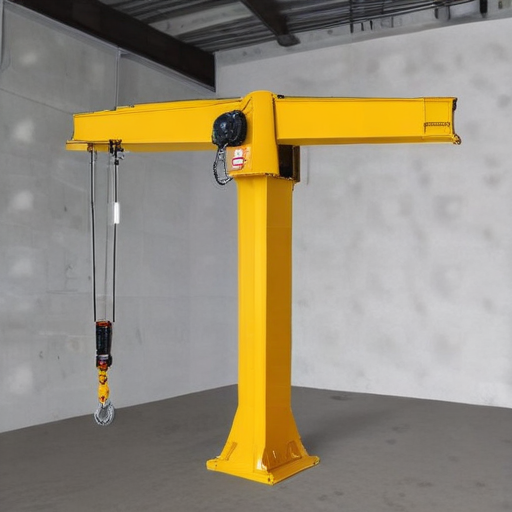
List Various Types of “1 ton jib crane for sale”
Certainly! Here are various types of “1 ton jib cranes” available for sale:
1. Wall-Mounted Jib Crane:
– Features: It’s mounted on an existing wall or column.
– Application: Ideal for workstations and production lines requiring side-to-side movement along walls.
2. Freestanding Jib Crane:
– Features: Uses a floor-mounted pillar, offering 360° rotation.
– Application: Ideal for independent operation in open areas without needing structural support.
3. Mast-Type Jib Crane:
– Features: Offers a combination of wall and floor mounting, requiring less force than the freestanding type.
– Application: Fits spaces where full-floor mounting can’t be achieved but wall mounting isn’t enough either.
4. Articulating Jib Crane:
– Features: Boasts dual arms for enhanced maneuverability.
– Application: Ideal for accessing hard-to-reach areas or navigating around obstacles.
5. Workstation Jib Crane:
– Features: Designed specifically for ergonomic handling and precise positioning tasks.
– Application: Perfect for light-duty tasks in workshops and assembly lines.
6. Portable Jib Crane:
– Features: Mobile base allows for movement across different locations.
– Application: Suitable for flexible applications where lifting needs vary by location.
7. Foundationless Jib Crane:
– Features: Bolts directly to an existing concrete floor without the need for a foundation.
– Application: Time-saving and cost-efficient; ideal for quick installation.
Each type of jib crane offers unique advantages tailored to specific operational needs, making them versatile tools for various industrial and commercial lifting tasks.
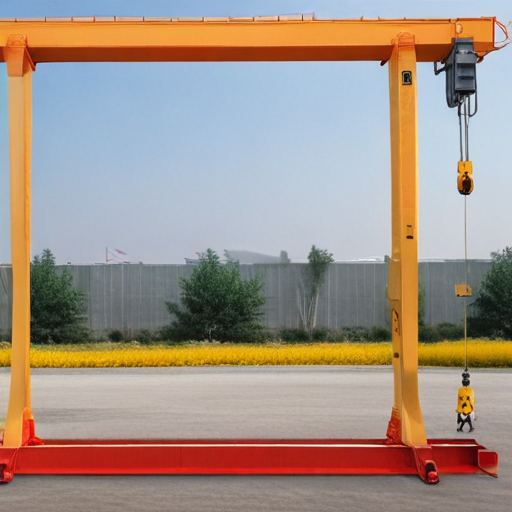
List Application of “1 ton jib crane for sale”
A 1-ton jib crane is a versatile piece of lifting equipment used across various industries to handle light to medium-weight loads efficiently. Here are some key applications for a 1-ton jib crane:
Manufacturing Facilities
– Machinery Maintenance: Provides lifting capabilities for repair and maintenance of machinery and equipment.
– Assembly Lines: Assists in the assembly process by moving components and finished products between workstations.
Warehouses and Distribution Centers
– Loading and Unloading: Facilitates the loading and unloading of goods from trucks or containers.
– Inventory Management: Helps in stacking, sorting, and transporting inventory items efficiently.
Metal Fabrication Shops
– Material Handling: Moves raw materials like steel beams, sheets, and other heavy metal parts to workstations.
– Precision Work: Supports precision machining and welding tasks by positioning components accurately.
Automotive Repair Shops
– Engine Hoisting: Lifts engines, transmissions, and other heavy automotive parts for repair or inspection.
– Component Replacement: Assists in replacing large vehicle parts without requiring additional manpower.
Construction Sites
– Material Lifting: Transfers construction materials such as concrete blocks, metal beams, and scaffolding components to different levels or areas.
– Installation: Aids in the installation of structural components and equipment.
Marine and Dockyards
– Boat Maintenance: Used for lifting engines, parts, and other heavy components during boat maintenance.
– Cargo Handling: Assists with loading and unloading cargo from ships.
Retail and Wholesale Operations
– Stocking: Helps in stocking heavy items on higher shelves in large retail or wholesale stores.
– Display Setup: Facilitates the setup and rearrangement of large display units or fixtures.
Healthcare Facilities
– Equipment Handling: Assists in the maintenance and installation of heavy medical equipment like MRI machines and hospital beds.
A 1-ton jib crane is thus highly beneficial for enhancing operational efficiency, safety, and precision in various settings where lifting and material handling are critical tasks.
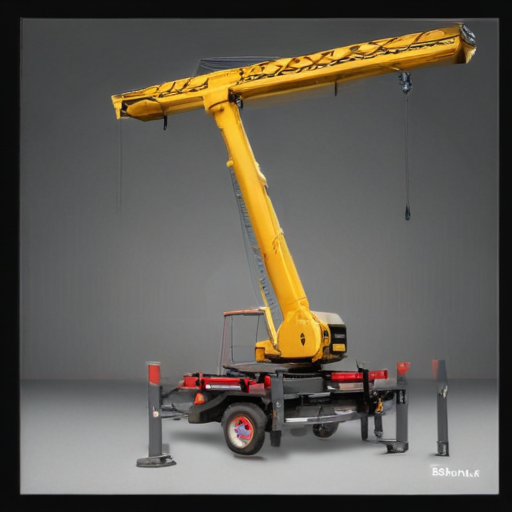
List Buyer Types of “1 ton jib crane for sale”
Certainly! When it comes to purchasing a 1-ton jib crane, there are various types of buyers, each with specific needs and preferences. Here are some common buyer types:
1. Industrial Manufacturers
– Profile: Large-scale manufacturing units handling heavy materials.
– Needs: Durable and robust jib cranes for repetitive, high-intensity lifting.
2. Construction Companies
– Profile: Firms engaged in building infrastructure.
– Needs: Reliable and portable cranes for on-site material handling.
3. Warehouses and Distribution Centers
– Profile: Facilities focused on storage and distribution.
– Needs: Efficient cranes for moving goods within confined spaces.
4. Automotive Workshops
– Profile: Workshops dealing with vehicle repairs and component manufacturing.
– Needs: Precision lifting equipment for handling engines and other heavy parts.
5. Shipyards and Ports
– Profile: Maritime facilities focusing on shipbuilding and cargo handling.
– Needs: Heavy-duty cranes capable of handling large volumes and weights.
6. Small Businesses and Start-ups
– Profile: Emerging enterprises with growing material handling needs.
– Needs: Cost-effective and versatile jib cranes for diverse operations.
7. Agricultural Operations
– Profile: Farms and processing plants dealing with heavy agricultural machinery.
– Needs: Durable and efficient cranes for operational resilience.
8. Mining and Mineral Processing
– Profile: Industries involved in extraction and processing of minerals.
– Needs: Robust cranes capable of operating in harsh conditions.
9. Recyclers and Waste Management Firms
– Profile: Companies dedicated to recycling and waste management.
– Needs: Sturdy cranes for handling and transferring heavy waste materials.
10. Educational and Training Centers
– Profile: Institutions offering practical training in heavy machinery and manufacturing.
– Needs: Reliable yet affordable cranes for instructional purposes.
Each buyer type has unique requirements, making it essential for sellers to tailor their offerings accordingly.
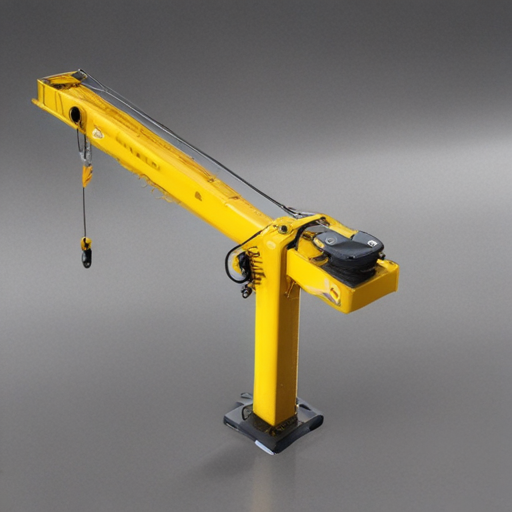
List “1 ton jib crane for sale” Project Types for Different Industries
Sure! Here’s a concise overview of project types using a 1-ton jib crane for sale across different industries:
Construction
– Small to Medium Construction Projects: Use for material handling, moving tools, equipment, and building materials on-site.
– Workshop and Fabrication Areas: Ideal for loading and unloading raw materials, and assisting with assembly tasks.
Manufacturing
– Assembly Lines: Facilitates the movement of parts and finished products between different stages of production.
– Maintenance Departments: Essential for lifting heavy machinery parts during repair and maintenance work.
Warehousing and Logistics
– Loading and Unloading: Efficient for handling goods in and out of storage areas, optimizing space and improving workflow.
– Inventory Management: Aids in the organization, movement, and stacking of inventory items in warehouse settings.
Automotive
– Vehicle Maintenance: Assists in the lifting of heavy components like engines and transmissions, making repairs more efficient and safe.
– Parts Manufacturing: Useful for maneuvering large parts and tools in manufacturing environments.
Marine
– Shipbuilding and Repair: Supports lifting and positioning heavy ship components, as well as handling supplies and tools.
– Dockside Operations: Facilitates the movement of goods and equipment from ship to shore and vice versa.
Aviation
– Aircraft Maintenance: Helps in lifting and positioning large aircraft parts securely for repairs and inspections.
– Manufacturing and Assembly: Assists in the production line of aircraft, ensuring safe handling of delicate and heavy components.
Utilities and Energy
– Power Plants: Useful for moving large equipment and tools required for plant maintenance.
– Oil and Gas: Essential for lifting heavy tools and equipment in drilling rigs and refineries.
Agriculture
– Farm Equipment Maintenance: Assists in the repair and handling of heavy farm machinery and equipment.
– Processing Plants: Facilitates the movement of large agricultural products and machinery in processing facilities.
Pharmaceutical and Chemical
– Laboratory Settings: Aids in the safe handling of heavy containers and equipment.
– Production Areas: Facilitates the movement of large batches of chemicals and pharmaceuticals during the manufacturing process.
Each industry benefits from the versatility of a 1-ton jib crane, enhancing safety, efficiency, and operational effectiveness.
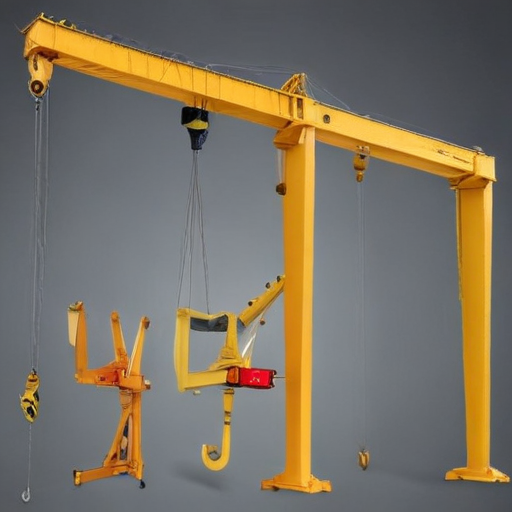
1 ton jib crane for sale Accessories Upgrades and Custom Manufacturing Options
Looking for a reliable 1-ton jib crane for sale? Our cranes are designed to facilitate efficient material handling while enhancing workplace safety. Here’s what we offer:
Accessories:
1. Electric Hoists: Enhance lifting efficiency with our range of electric hoists.
2. Motorized Rotation Kits: Improve maneuverability with easy, motorized rotation.
3. Adjustable Booms: Versatile adjustments for various lifting heights and ranges.
4. Control Panels: Simplify operations with user-friendly control panels.
5. Hooks, Clamps, and Trolleys: Variety of end attachments for different lifting requirements.
6. Festoon Systems: Organize cables and hoses safely.
7. Limit Switches: Prevent over-travel and improve control.
Upgrades:
1. Automated Systems: Integrate with advanced automated systems for precision and efficiency.
2. High-Duty-Cycle Motors: For rigorous, continuous use.
3. Enhanced Safety Features: Additional alarms, emergency stop controls, and fail-safes.
4. Corrosion-Resistant Coatings: Ideal for outdoor or harsh environments.
5. Weather Protection: Components designed to withstand extreme weather.
Custom Manufacturing Options:
1. Specific Height and Reach: Tailor the crane’s dimensions to fit your workspace perfectly.
2. Base Mounting: Floor, wall, or column mounting options based on your facility’s requirements.
3. Custom Load Capacities: Adjustments for specific weight capacities if needed.
4. Specialized Jib Arms: Custom-designed arms for unique applications.
5. Integration with Existing Systems: Seamless coordination with your current infrastructure.
Our 1-ton jib cranes are customizable to perfectly match your specifications and enhance operational efficiency. Contact us to discuss your specific needs and find out how our solutions can improve your material handling processes.
List Quality Control and The Manufacturing Process of “1 ton jib crane for sale”
Quality Control
1. Raw Material Inspection:
– Perform chemical and physical tests on materials like steel to verify compliance with specifications.
2. Component Testing:
– Ensure that components like motors, gears, and bearings meet required standards through testing.
3. Welding and Fabrication Inspection:
– Conduct non-destructive testing (NDT) such as ultrasonic or radiographic testing to ensure weld quality.
4. Dimensional Accuracy:
– Use precision instruments to check dimensions against design specifications.
5. Load Testing:
– Subject the crane to maximum rated load plus a safety margin to verify structural integrity and performance.
6. Electrical System Testing:
– Inspect and test electrical components and wiring for safety and functionality.
7. Coating and Finish Quality:
– Check for uniformity and adherence of paint or other coatings to ensure corrosion resistance.
8. Final Inspection:
– Perform a comprehensive inspection of the assembled crane, including operational tests.
9. Documentation:
– Maintain detailed records of all inspections and tests for traceability and compliance.
Manufacturing Process
1. Design and Planning:
– Create detailed engineering drawings and plans. Perform simulations and stress analysis.
2. Material Procurement:
– Acquire high-quality raw materials such as steel and electrical components.
3. Cutting and Shaping:
– Use CNC machines or laser cutters to shape materials according to design specifications.
4. Welding and Assembly:
– Weld the crane’s structural components together using precision techniques. Assemble components like the jib arm, base, and rotating mechanism.
5. Machining:
– Machine components such as gears and shafts for exact fits.
6. Surface Treatment:
– Apply treatments like galvanization or painting to protect against corrosion.
7. Electrical Assembly:
– Install wiring, control panels, and motors. Ensure all electrical systems are configured correctly.
8. Quality Control Testing:
– Perform multiple levels of testing as outlined in the Quality Control section.
9. Final Assembly:
– Conduct final assembly and ensure all moving parts and mechanisms operate smoothly.
10. Packaging and Shipping:
– Safely package the crane components and arrange for transportation to the customer.
This thorough approach ensures that each 1-ton jib crane meets high standards of quality and performance before reaching the end user.
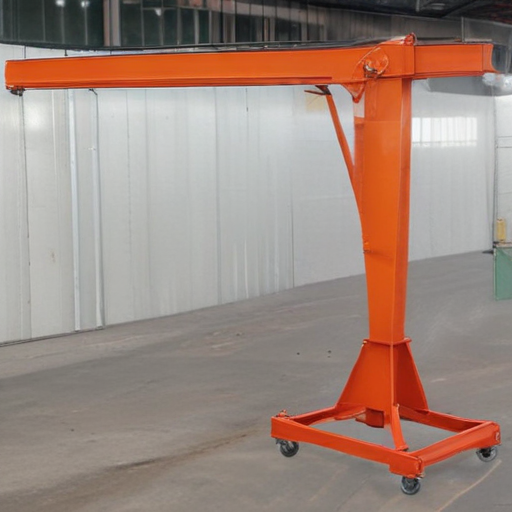
How to use “1 ton jib crane for sale”
Absolutely, here’s a concise and informative passage on using a 1 ton jib crane that’s available for sale:
—
Looking to streamline your material handling processes? A “1 ton jib crane for sale” could be the perfect addition to your workspace. This versatile equipment is designed to handle loads up to 1 ton with ease, offering substantial benefits to various industries such as manufacturing, construction, and warehouses.
Key Features:
– Capacity: Up to 1 ton (2,000 pounds)
– Rotation: 180 to 360 degrees, providing extensive coverage.
– Ease of Installation: Mounting options include wall-mounted and floor-mounted models, making it adaptable to different work environments.
– Material: Typically constructed from high-grade steel for durability and longevity.
– Customization: Options for customizing height, jib arm length, and other specifications to meet exact requirements.
Advantages:
1. Efficiency: Simplifies the lifting and moving of heavy materials, reducing manual labor and increasing productivity.
2. Safety: Reduces the risk of workplace injuries by handling heavy loads safely.
3. Space-saving: Ideal for small spaces due to its compact design.
4. Cost-effective: Offers high value through its durability and the reduction of labor costs.
Usage Tips:
– Inspection: Regularly inspect the crane for wear and tear to ensure safe operation.
– Training: Ensure all operators are adequately trained in using the crane, including understanding load limits and safe operation procedures.
– Maintenance: Adhere to a maintenance schedule to prolong the equipment’s lifespan.
– Load Management: Never exceed the maximum load capacity of 1 ton to avoid accidents or equipment failure.
Considering adding a jib crane? Explore a range of options available for sale to find the perfect fit for your operational needs. A wise investment, a 1 ton jib crane can transform your material handling efficiency, safety, and overall workflow.
—
This passage provides a brief yet comprehensive overview of the benefits, features, and proper usage of a 1 ton jib crane, conveying vital information within the 300-word limit.
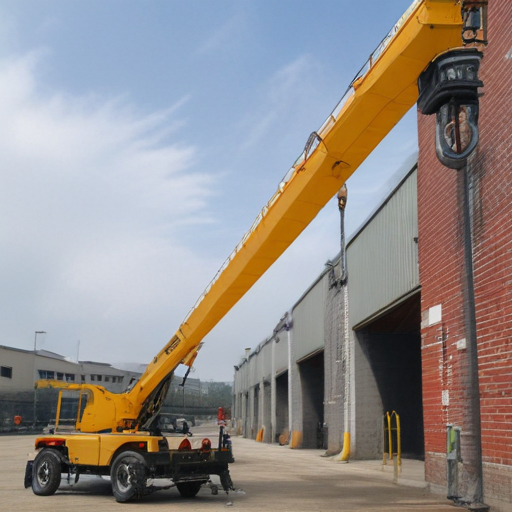
“1 ton jib crane for sale” Comparative Analysis
When examining the market for a 1-ton jib crane, several key factors must be considered to make an informed purchase. These factors include price, specifications, brand reputation, and additional features.
1. Price:
Prices for 1-ton jib cranes can range significantly, often starting at around $1,000 for basic models and scaling up to $5,000 or more for advanced options. Lower-cost models typically offer fewer features and may use less durable materials, whereas the higher-priced cranes often come with enhanced durability, extended reach, and additional features.
2. Specifications:
Typical specifications to consider are the maximum load capacity (1 ton in this case), boom length, rotation angle, and height. Many models offer a 360-degree rotation, though some may have limited rotation to 180 degrees or less. Boom lengths can vary, affecting the reach and work area of the crane.
3. Brand Reputation:
Brands like Gorbel, Vestil, and Spanco are well-regarded in the industry for their reliability and quality. Established brands often come with better warranties, customer support, and a track record of durability. Lesser-known brands may offer competitive pricing but could lack in after-sales service and long-term reliability.
4. Additional Features:
Advanced models might come with customizable height options, motorized rotation, and enhanced safety features such as load limiters and overload protection systems. These can add value and functionality, making the crane more versatile and safer to operate.
Comparative Analysis:
For a basic, budget-friendly model, the Vestil JIB-CB-1000 typically offers solid performance at an affordable price but may lack some advanced features. The Gorbel WSJ360, often priced higher, provides superior materials and features like full 360-degree rotation and customizable options, making it ideal for more demanding applications. Spanco models usually fall in between, offering a balanced mix of durability, features, and price.
Conclusion:
Choosing the right 1-ton jib crane depends on your specific needs and budget. For reliability and premium features, investing in a higher-end brand like Gorbel may be worthwhile. For simpler tasks and lower budgets, Vestil provides a cost-effective solution. Always consider long-term value, safety, and the nature of your application when making a decision.
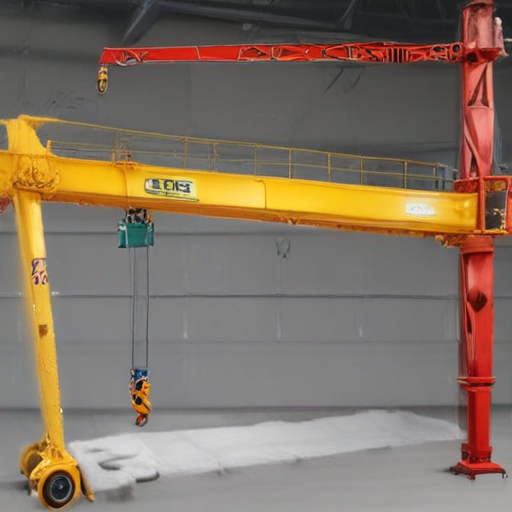
“1 ton jib crane for sale” Warranty and Support
When considering the purchase of a 1-ton jib crane, understanding the warranty and support options available is crucial. Most reputable manufacturers offer a warranty period, typically ranging from one to two years, which covers manufacturing defects and workmanship issues. Some may provide extended warranty options for an additional fee.
The warranty generally includes:
1. Parts and Labor: Replacement of defective parts and labor cost for repairs.
2. Technical Support: Access to customer service and technical support teams for troubleshooting and assistance.
3. On-site Service: In certain cases, manufacturers may offer on-site repair services.
Always check the specific terms outlined in the warranty document to understand what is covered and any exclusions. Regular maintenance performed by the user may be required to keep the warranty valid.
Support typically encompasses:
1. Installation Assistance: Guidance or services to ensure proper installation.
2. Training: Instructional resources or on-site training to ensure safe and efficient operation.
3. Spare Parts Supply: Availability of essential parts to minimize downtime.
4. Online Resources: Access to manuals, FAQs, and troubleshooting guides.
Before purchase, clarify the following:
– Warranty Duration: Confirm the start and end date of the warranty period.
– Coverage Details: Understand what is included and any parts that may be excluded.
– Service Process: Know how to initiate a warranty claim or service request.
– Support Accessibility: Ensure that technical support is easy to reach and responsive.
Opting for a jib crane from a manufacturer with robust warranty and support can significantly enhance your investment’s reliability and lifespan. Always read customer reviews and consult with sales representatives to make an informed decision.
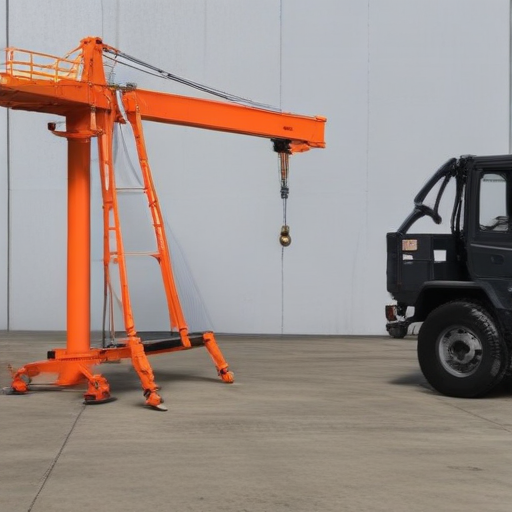
List “1 ton jib crane for sale” FAQ
Sure, here are some frequently asked questions (FAQ) about purchasing a 1-ton jib crane:
1. What is the lifting capacity of a 1-ton jib crane?
– A 1-ton jib crane has a lifting capacity of 2,000 pounds or approximately 907 kilograms.
2. What types of 1-ton jib cranes are available?
– Various types include wall-mounted, free-standing, floor-mounted, and mast-type jib cranes.
3. What is the installation process for a 1-ton jib crane?
– Installation typically involves securing the crane to a wall or floor, ensuring proper bolting and mounting, aligning the jib’s arm, and testing for proper operation.
4. Can a 1-ton jib crane be used outdoors?
– Yes, but it requires weatherproofing and rust-resistant materials. Ensure it’s rated for outdoor use.
5. What are the power options for a 1-ton jib crane?
– They’re usually available in manual, electric, or pneumatic versions, depending on specific needs.
6. What is the typical span and height of a 1-ton jib crane?
– Spans generally range from 8 to 20 feet, while height varies but generally can be customized.
7. What are the maintenance requirements?
– Regular inspections, lubrication of moving parts, checking for wear and tear, and testing the integrity of the structural components are essential.
8. Are there any safety features to consider?
– Look for overload protection, emergency stop functions, and safety latches.
9. How much does a 1-ton jib crane cost?
– Prices vary based on type, features, and brand but typically range from $1,500 to $10,000.
10. Can a 1-ton jib crane be customized?
– Yes, many manufacturers offer customization options for specific operational needs or space constraints.
11. What are the lead times for delivery?
– Lead times can vary but typically range from a few weeks to a couple of months depending on customization and supplier.
12. Is training required to operate a 1-ton jib crane?
– Yes, it is advisable to undergo proper training for safe and efficient operation.
13. What is the warranty period?
– Warranties usually vary from 1 to 5 years, depending on the manufacturer.
This FAQ provides a concise overview to help potential buyers make an informed decision about purchasing a 1-ton jib crane.
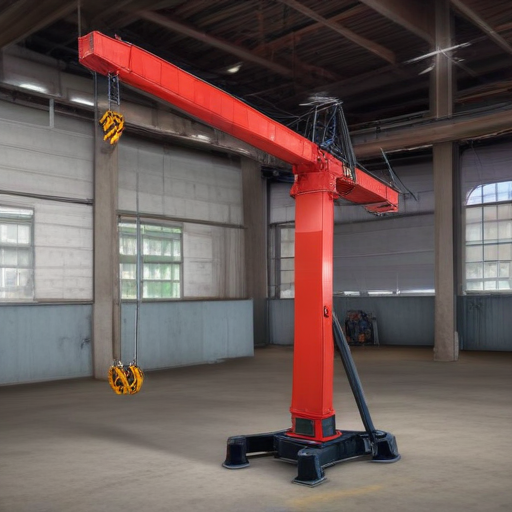
Top 10 FAQ with answer about 1 ton jib crane for sale for Buyer Sourcing from China
Sure! Here are the top 10 frequently asked questions (FAQ) about sourcing a 1-ton jib crane from China, along with concise answers:
1. What is a 1-ton jib crane?
– A 1-ton jib crane is a hoisting device with a maximum lifting capacity of 1 ton (or 2,000 pounds), used for material handling in various industries.
2. What types of 1-ton jib cranes are available?
– Common types include free-standing, wall-mounted, and mast-type jib cranes, each designed for different installation scenarios and operational needs.
3. How do I ensure the quality of a jib crane from a Chinese supplier?
– Verify the supplier’s certifications (ISO, CE), request product samples or case studies, and seek third-party inspection before shipment.
4. What are the key components of a 1-ton jib crane?
– Main components include the jib arm, hoist, base, control system, and sometimes motorized trolley, depending on the model.
5. What is the typical lead time for delivery?
– Lead time generally ranges from 4 to 8 weeks, though it can vary based on the supplier’s production schedule and customization requirements.
6. Can I customize the jib crane to suit my operational needs?
– Yes, many manufacturers offer customization options for arm length, mounting type, and specific features to meet your operational requirements.
7. What is the average cost of a 1-ton jib crane from China?
– Prices typically range from $1,000 to $5,000, depending on specifications, customization, and additional features.
8. What shipping methods are available?
– Most suppliers offer sea freight, though air freight is an option for smaller or urgent orders. Confirm shipping methods based on your location and urgency.
9. What warranties do Chinese manufacturers generally offer?
– Warranties typically range from 1 to 2 years, covering manufacturing defects and major component failures. Always verify the warranty terms with the supplier.
10. How can I handle technical issues or maintenance once the crane is installed?
– Many suppliers provide manuals, online support, and can arrange for local maintenance teams. Partnering with a reputable supplier ensures better after-sales support.
By addressing these questions, buyers can make more informed decisions when sourcing 1-ton jib cranes from China.

